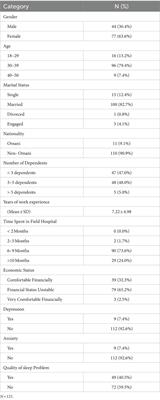RETROSPECTIVE STUDY ON THE EMOTIONAL STATUS OF HEALTHCARE WORKERS IN A COVID-19 FIELD HOSPITAL IN OMAN

To combat the overwhelming demand for medical services and care during the COVID-19 Pandemic, the Sultanate of Oman launched the COVID-19 Field Hospital in 2020, designed to respond and alleviate the burden on the medical infrastructure. Several studies globally and from the Middle East suggested that frontline healthcare workers (HCW) were at risk of developing markers of psychological distress. It was further understood through research findings that HCW were resilient during times of crisis. However, there is a dearth in studies evaluating the emotional status of frontline HCW posted in the COVID-19 field hospitals in Gulf Countries, including Oman. This study attempts to shed light on the emotional status of HCW that were on the frontlines in the field hospital in the Sultanate of Oman. Aim:This study aims to quantify and evaluate the emotional status of HCW in the frontline field hospital by screening for symptoms of depression, anxiety, and sleep quality. Method: The data was collected by a local private mental healthcare facility as part of digital feedback to design and implement supportive strategies. Data was collected between September 2021 to October 2021 from 121 HCW in the COVID-19 Field hospital in Oman via 'WhatsApp'. Results: Chi square and binary logistic regression tests were administered to evaluate the data.
The participants comprised of 63.6% females and 79.3% were between 30-39 years of age. Majority of the participants (65.2%) described themselves as 'financially unstable' and possess an average of 7.5 years of work experience. Of the participants 73.6% of the HCW were based solely in the field hospital for 6-9 months at the time of the survey. Majority of the participants denied the presence of emotional distress expressed through depression (92.6%), anxiety (92.6%) and poor quality of sleep (59.5%). Conclusion: The findings of the present study reflect the HCW ability to cope during challenging situations likely owing to a variety of environmental, social and personal protective factors.
The findings of this study can translate into further research on identifying and addressing stressors and targeting the enhancement of protective factors to safeguard the well-being of HCW.
Read the full article at the original website
References:
